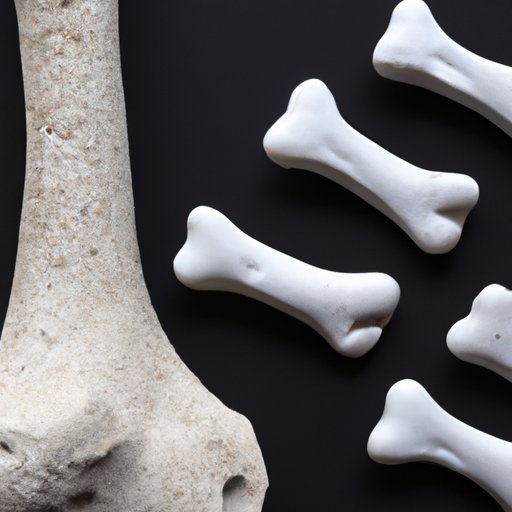Introduction
Mineralization is an important process that occurs in both human and animal skeletal systems. It involves the deposition of minerals such as calcium, phosphorus, and magnesium into the matrix of bones, which helps to strengthen them and make them more resilient. This article will explore what mineralization is, its role in bone development and health, and how it differs from calcification. Additionally, we will discuss the importance of nutrition for promoting mineralization of bones.

Exploring the Process of Mineralization and its Role in Bone Development
Before discussing mineralization, it is important to understand the process of bone development. Bone formation begins when cells called osteoblasts produce a protein-rich matrix known as collagen. This matrix provides structure and support for the bone and is then filled with minerals such as calcium, phosphorus, and magnesium. The combination of protein and minerals creates a strong, resilient material known as bone tissue.
Mineralization is the process by which minerals are deposited into the bone tissue. This process is essential for proper bone development and health. Mineralization helps to strengthen bones and make them more resistant to fractures and other forms of damage. Additionally, minerals such as calcium and phosphorus help to regulate the body’s pH levels and provide essential nutrients for the growth and maintenance of bone tissue.

The Benefits of Mineralization for Bones
Mineralization has many benefits for bones. For one, it increases the strength and density of bones, making them less prone to fractures. Additionally, minerals such as calcium help to regulate the body’s pH levels, which can help prevent conditions such as osteoporosis and arthritis. Finally, minerals provide essential nutrients for the growth and maintenance of bone tissue, which helps to ensure that bones remain healthy and strong.
An Overview of the Mineralization of Bone
The process of mineralization occurs in several stages. First, minerals are released from the bloodstream and deposited onto the surface of the collagen matrix. This process is known as adsorption. Next, minerals are incorporated into the matrix, creating a mineralized deposit. Finally, the mineralized deposits become part of the bone tissue, strengthening and increasing the density of the bone.
Mineralization is a continuous process throughout the lifetime of a person. During childhood, mineralization is especially important for the development of strong and healthy bones. As a person ages, mineralization continues to occur but at a slower rate. This is why it is important to maintain good nutrition and exercise habits as you age in order to promote mineralization and keep your bones healthy.

The Difference Between Mineralization and Calcification in Bone
While mineralization and calcification are often used interchangeably, there are some key differences between the two processes. Calcification is the process by which calcium is deposited into soft tissues such as muscles and tendons. This process does not involve the incorporation of minerals into the matrix of bone tissue, as is seen in mineralization. Additionally, calcification does not provide the same level of strength and protection as mineralization.
Investigating the Link Between Nutrition and Bone Mineralization
Nutrition plays an important role in promoting mineralization of bones. Calcium is the most abundant mineral in bones, and it is essential for healthy mineralization. Good sources of calcium include dairy products, green leafy vegetables, nuts, and legumes. Additionally, Vitamin D is important for the absorption of calcium. Vitamin D can be obtained through exposure to sunlight or through the consumption of fortified foods such as milk and cereals.
In addition to getting enough of the right nutrients, it is also important to engage in regular physical activity. Exercise helps to stimulate the production of new bone tissue, which increases the amount of minerals available for mineralization. Additionally, weight-bearing exercises such as running, walking, and lifting weights can help to promote mineralization of bones.
Conclusion
Mineralization is an essential process for healthy bone development and health. It involves the deposition of minerals such as calcium, phosphorus, and magnesium into the matrix of bones, which helps to strengthen them and make them more resilient. Additionally, minerals help to regulate the body’s pH levels and provide essential nutrients for the growth and maintenance of bone tissue. Nutrition and exercise are both important for promoting mineralization of bones.
In conclusion, mineralization is an important process for maintaining strong and healthy bones. By understanding the role of nutrition and exercise in promoting mineralization, you can take steps to ensure that your bones remain healthy and strong throughout your life.
(Note: Is this article not meeting your expectations? Do you have knowledge or insights to share? Unlock new opportunities and expand your reach by joining our authors team. Click Registration to join us and share your expertise with our readers.)
